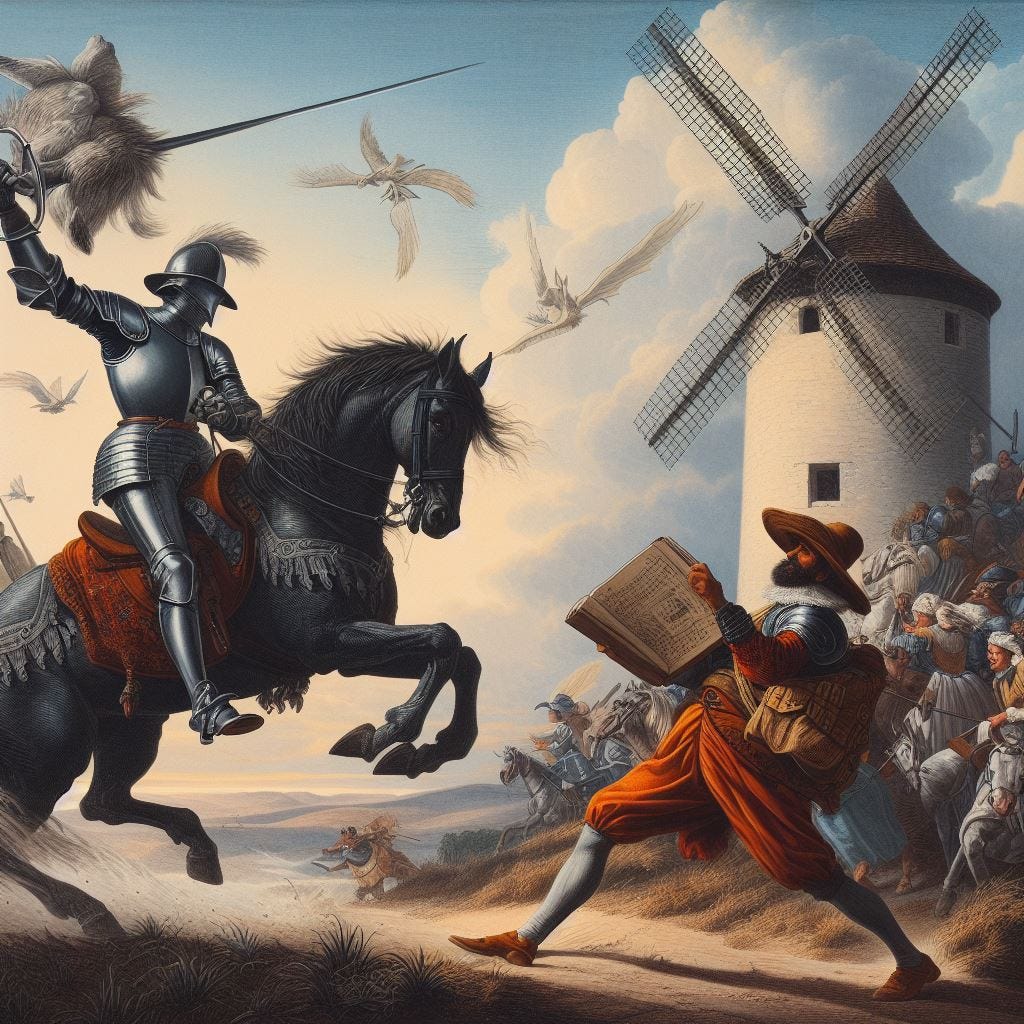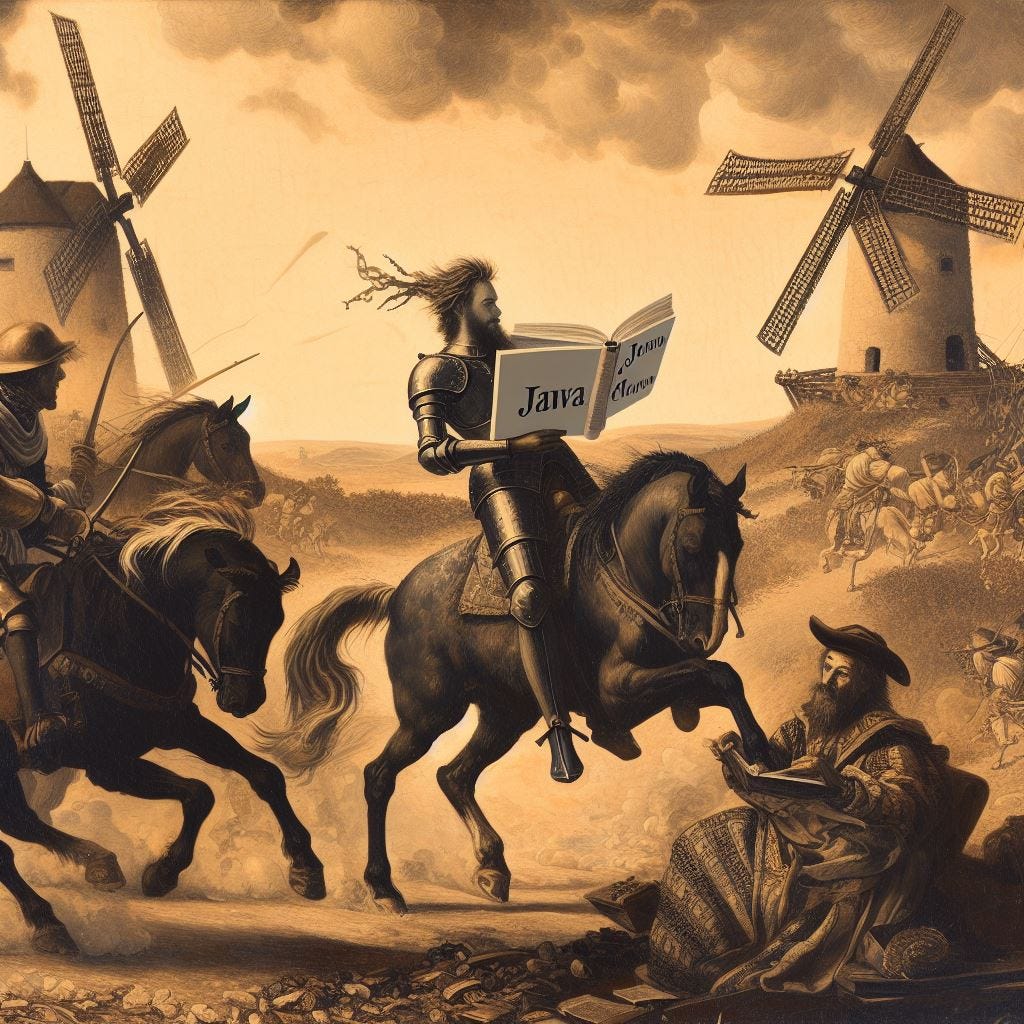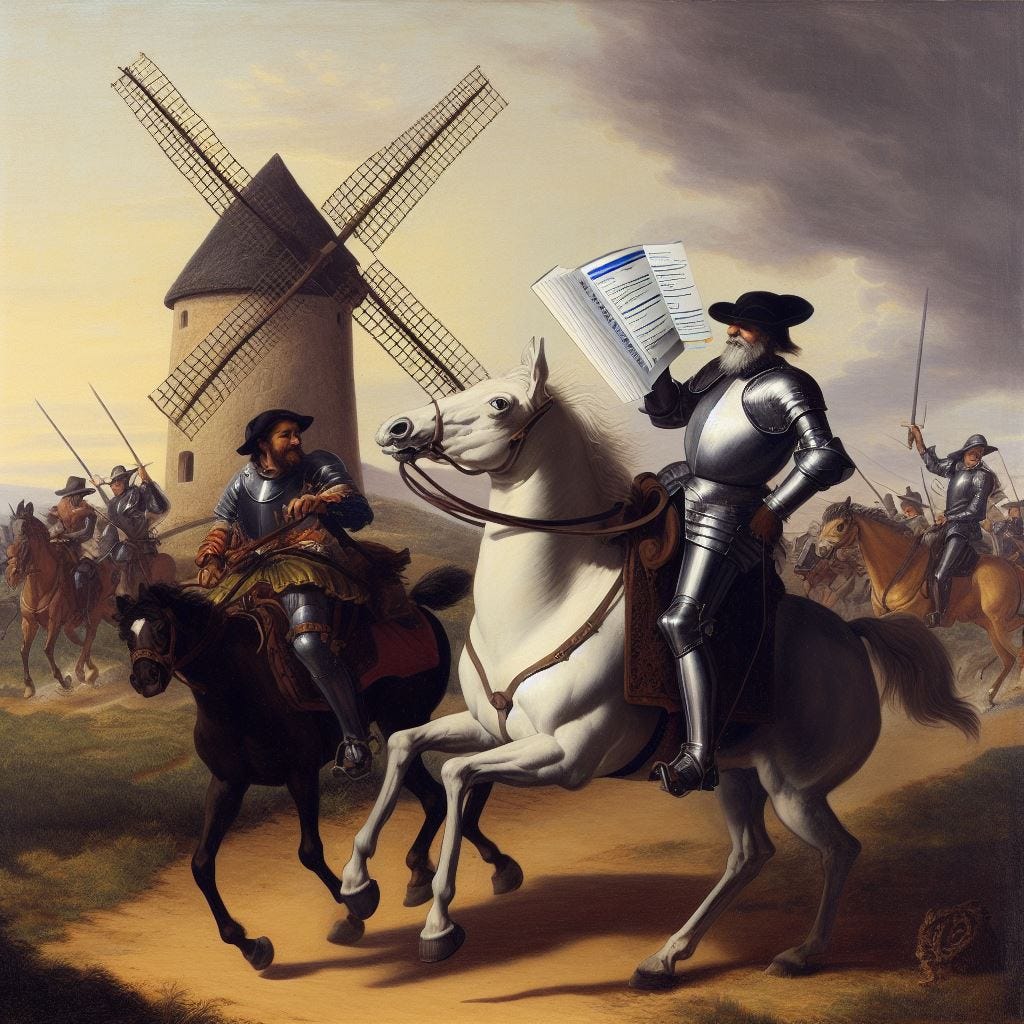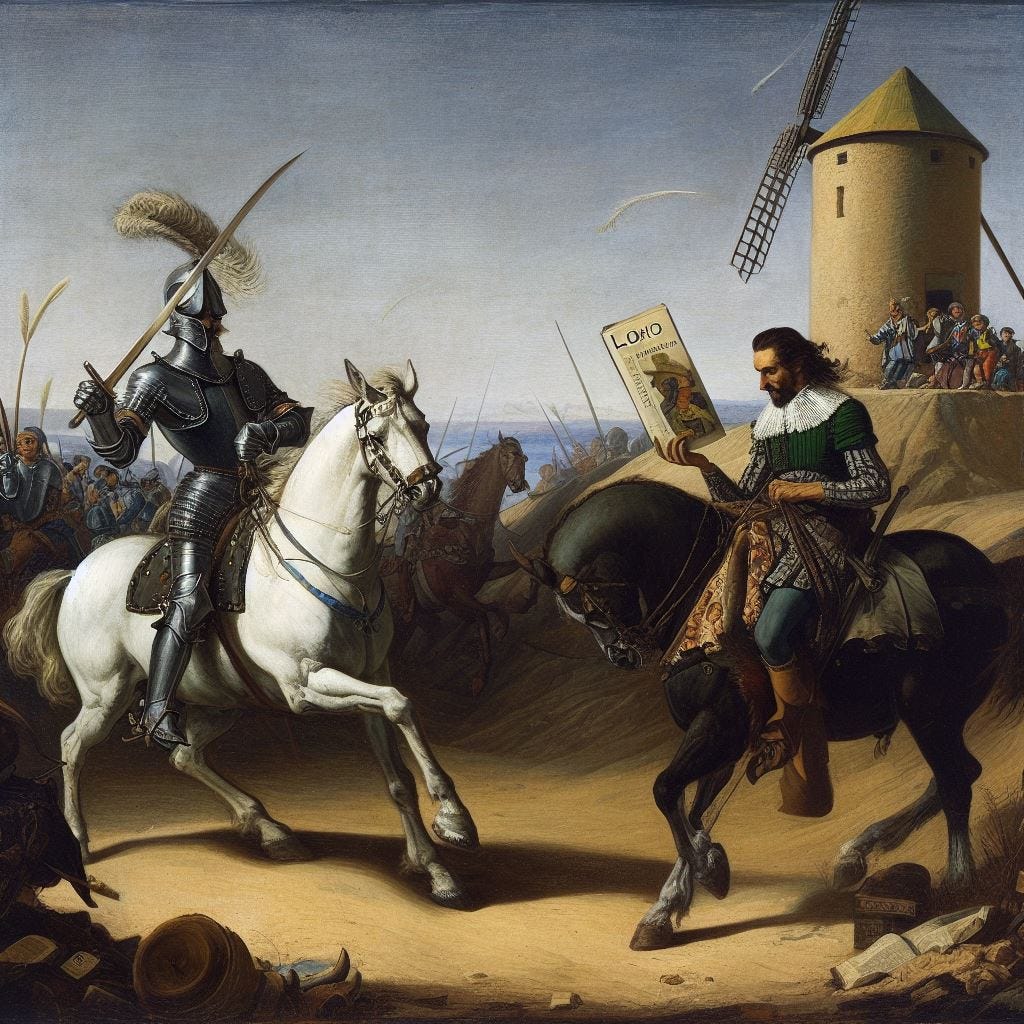I've been writing boundaries for various ontologies…
Don Quixote & Loki - the remix Don Quixloki
I've been writing boundaries for various ontologies…
Looking at this sentence makes it seem very abstract. If I add that this writing was stuff for work, one may begin to think it is more jargon of a trade than dilettante scholarship, or perhaps, a revolutionary fervour.
As trade jargon, one may think it has something to do with computer software, some object-orientated programming, while possibly referring less to coding in scripting languages wherein 'ontologies' are more set already.
If I move back to the word ‘boundaries’ instead of ontologies, it may mean I am writing about properties, either real estate boundaries, or possibly, philosophical categories and where they end, or are bounded, and so bind our minds as they/we predicate the objects of experience or thought.
Useful categories like truth.
What I have actually been doing at work is somewhere in between.
So I am creating a process, much to my not-delight, which involves creating boundaries for people who do not really have them, not intuitively. Or where in some intersubjective aggregate we get confused by the variety of life, we do not quite meet in the middle, but pull away to strange attractors, either of aggregated iterated bias, or assumptions of interpretation when we are feeling quite open-minded.
Now with words, I am more of a use person than a definition person when it comes to meanings. This is the traditional Anglophone world way of doing things, we have descriptive dictionaries, not prescriptive commandments as dictated by some gang of grammarians selected by the French king’s mistress.
So when I start using words in new ways, the new ways are the definition, if we get to the end of the process. Computer programming does not work like this so much, even if LLMs produce usable code. (Interesting thought bubble there, hmm.)
Try starting again.
Ontology refers to a philosophical use of the Indo-European word used to join bits of sentences (the copula) which comes down in English as ‘to be’. Here in ontology, it is from the Greek, but it is a 1600s usage, where the genitive form of the Greek form of the verb, ontos, is used to refer to 'that which is' or 'being', is combined with -logia (-λογία, 'logical discourse') in a moment of Neo-Latinate neologism. (I hope I got that right.)
An ontology then, if I put into small words, is bunch of words referring to words that are used to say what are objects or subjects, are in or out, as if reality was real as ontology portrays, and that ontology could capture all that by itself, by being hard and fast with the right words, as if it knew what it was doing.
Hmmmh.
Do we know what we are doing? And, how do we find out?
Apparently with the right ontology that doesn’t matter.
Yeah, right.
In the beginning
Why is this verb ‘to be’ used as the copula in Indo-European languages, dear sky father? What language would we have, what philosophical systems would we have if we used another verb as copula? (And then different words as auxiliary verbs? To have, to should).
Or have no copula at all?
Silly ontologies, silly, is it all fucked?
Starts again.
Back to the work stuff… —writing ontologies.
Writing ontologies is not my preference. I think I am an anarchist. I think I am there to re-frame and provoke creative new frames which better the world. I might deliberately cross boundaries, to blur them, or to troll for a joke (and the boundaries between these doings/categories are very blurry but are policed by our shared agreeableness (politeness/respect)).
I do not do it to crowd-surf the chaos so I can become another Putin, another Elon Musk.
So I am always shocked by those folks who boundaries are weak, non-existent, and those who are blithely unaware of them. What is the point of being an anarchist if no one notices you have crossed some boundary?
The shock of non-recognition.
Basically you are not an anarchist if no one notices the boundary you have heroically crossed in order to save the world. Fail.
<Insert tilting at windmills here by AI>
So even I feel the need, as a failed anarchist, where people have very weak boundaries, where the expected behaviour of a system or personality dealing/working in that system, might not happen in a routine enough manner… — to write frameworks rather than to breach them like some white-hatted hacker.
Fortunately my other failures of identity kick-in here, more poetry-based creativity and I can write boundaries. I can.
I can.
Interestingly the same re-framing skillset is used by both the failed anarchist and the failed poet.
Exactly.
Re-starts.
I really do not like the word ontologies and their object-orientated methodologies, and I object to that whole objecty way of doingthings, it’s a mistake of some kind, but you know, people… but you know, what-people-know-already is what they already know, so, I agreeable work within what is practically available in peoples’ minds.
If I can guess what that is. Surprises abound.
People.
Things.
People and things they think are objects, but are they? Really?
But enough of that dismissal of ontological work — and people's’ animal recursive tooling-up natures— this is about boundaries, and the territories we roam.
As animals.
Begins again - the spur for this post…
Recently a meme passed me by on a social media platform. The basic gist was that there was a gendered typology (that is the least gendered way to say it), where one gender goes to therapy to learn how to set boundaries, and the binary-gender goes to learn how to respect them.
I'll let you work out who does what, and how exceptions to this binary system are generalised out to create a meme about boundaries, while re-inscribing the process that creates them, in a notice of them… —way messy.
Let’s just say if I did the same gendering thing in an inversion I would get in trouble. I am not anarchist enough now to do that.
Even if it was supportive on inclusiveness, it may not be read that way because of… — the framework, the perspective, the— wait-for-it— gendered Point of View ontology/ies one is trying to overcome, and re-frame. But is thwarted by the rreality of someone’s lived experience which has to be honoured.
Gendering is a way of rendering the world with noun classses derived from social categories. So ontologies are weird, but useful on occasion when not dressed up in drag on special occasions.
Useful to who though?
Sky father! wWy did you let those proto-indo-european teenage girls innovate with a genitive form of a plural noun, to form a noun-class we inherited as feminine, which resulted in neuter and then masculine noun-class genders, why did you forsake us!!
Bastard.
(Yes, typologies are a type of ontology so we haven’t moved on yet… but I tried by using a different word.)
Loki, what do you mean it’s all a myth?
In the beginning all typologies are typos.
Starts again.
I've been writing boundaries for various typologies…
—illustrating ideas of how to decide whether or not to include some item/resource/material X, or not, into a collection, or not, and if no collection is appropriate, whether one should include it by making a completely new collection/category/group, and so, how to do that from the beginning.
And how agreed values provide the discipline of forming the new category/collection/topic/theme, of in-forming but not de-forming the whole project.
Ontologies/typologies are informed by values/frameworks, and if they are not recognised weirdness can result where peeps mistake the ontologies for the values (e.g. gender).
Or at least a preference for structure, or types of structure or routine, blinds us, and the preferences is seen as the structure, and a changes to the structure are perceived to be a threat.
DANGER< DANGER!
Here values are confused with the outcomes of practical choices.
Such that they cannot be discussed, only identified with, such that then they cannot be agreed on, but only fought about, because questions are not allowed.
DANGER< DANGER!
This is bad worlding, and often done in fear of competing categories which may only differ by the colour of their skin.
I mean, what would Jesus do?
Much later reflections after all the beginnings were done and dusted
What was interesting to me in this process, was not just how accurate or inaccurate the typology “is” to real life, nor how it could be bettered, or re-built so we can world better, but why boundaries are important as creative constraints that produce useful discipline of routine, i.e. that world (verb); that produce nurturing world-building contexts, (in a way that a gendered meme does not, the way a universal dominant gendered meme does not).
When more than mean survival is possible. When we have modern complex economies. Like now, when we have the time and resources to actually think about things.
Ontologies are not necessarily bad. They are just a tool in our recursive toolkit. We just make them badly at times, and use them worse.
The end of the beginnings.
Constraints are disciplines that maintain skills and produce structures (including ontologies but not limited to them).
Some constraints are values we discuss and agree to because we are agreeable and wish to build a world for our children.
Questions are constraints.
Reposted and edited in May 2025 at whyweshould.loofs-samorzewski.com.








